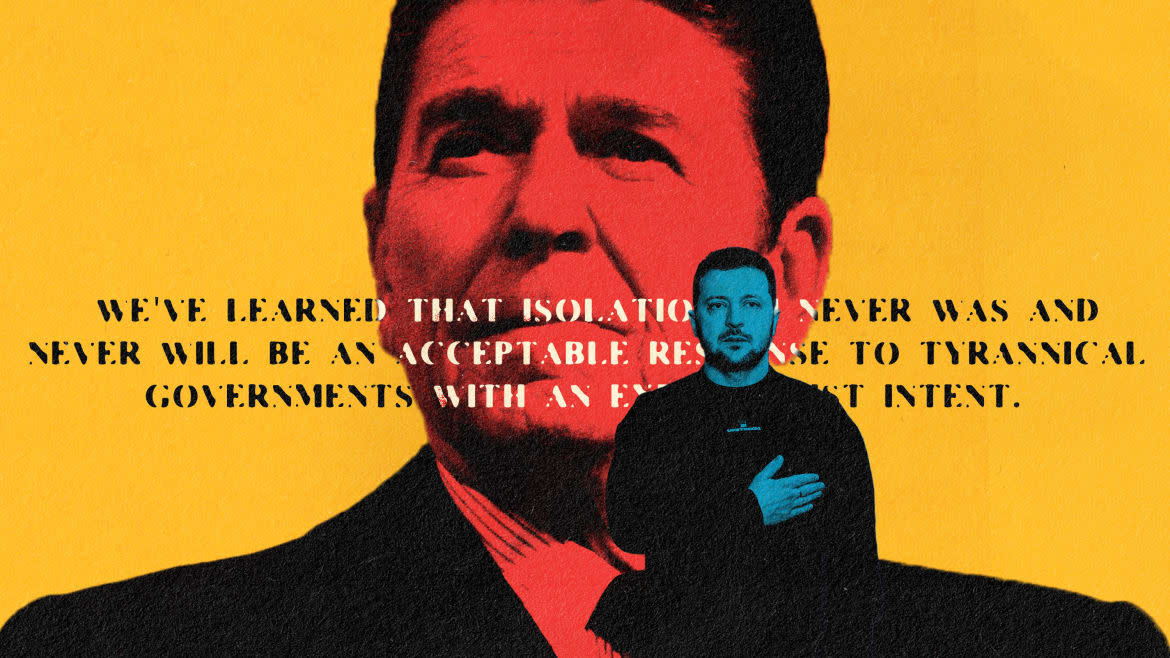Reagan’s Republican Party Wouldn’t Think Twice About Aid to Ukraine

Republicans continue to be divided over whether to support Ukraine, and that, in and of itself, is a problem. According to a survey last month by the Pew Research Center, 44 percent of Republicans now say we are giving too much aid to Ukraine.
The good news is that, as is the case with most issue polling, the numbers seem contingent on 1) how the questions are asked and 2) whether respondents are prompted with information before they are queried.
For example, another survey (conducted around the same time on behalf of the Ronald Reagan Institute) found that the numbers “moved significantly” when respondents were informed that our spending in Ukraine constitutes just 3 percent of the U.S. military’s budget, that Ukraine “remains in control of roughly 83 percent of its territory,” and that “the war has severely degraded Russia’s military power and its ability to threaten NATO allies.”
Americans Can’t Even Agree on What Our Country Is
These conflicting results are partially explained by a Republican Party in the midst of an identity crisis.
As conservative columnist Matthew Continetti concluded, “in the absence of energetic and effective leadership, negative partisanship determines voter attitudes. Republicans soured on aid to Ukraine not because they side with Russia, but because they consider the war to be another wasteful Biden project. When Republicans learn the facts behind U.S. involvement, however, their instinctual hawkishness kicks in. What they have lacked is a prominent GOP spokesman for freedom.”
All this is to say: Words matter. And leaders matter. As John F. Kennedy said of Winston Churchill, “He mobilized the English language and sent it into battle.” In a different way, Ronald Reagan marshaled his moral clarity and rhetoric to inspire Americans and dissidents in the Soviet Union to win the Cold War.
Today, however, traditional conservatives like Mike Pence, who try to carry the Reagan banner, are increasingly outgunned by a small but loud minority of Republican politicians who oppose sending aid.
Meanwhile, Republican politicians like Florida Gov. Ron DeSantis can’t make up their minds about where they stand on the issue.
Fortunately, there are emerging efforts to fill this leadership void, including a new group called Ukraine Strong that is headed by former senior GOP campaign officials, spokesmen, and operatives. As their website warns, “…Republican sentiment inertia is being pulled towards retreat and isolationism, making future conflict more likely.”
Voices like these are necessary because rank-and-file Republicans are clearly torn over this issue. While Republicans may be somewhat predisposed to support U.S. aid to Ukraine out of sheer muscle memory, the zeitgeist—for now, at least—clearly favors the opposite camp.
I’m concerned that the anti-Ukraine trend on the right will enforce Russia’s belief that if they bide their time, America will eventually cut and run. This commentary is both depressing and surprising.
If you were to transport a Republican from the year 2000 to present day, he or she would be stunned by today’s “dovish” GOP. I’ve been paying close attention to politics for decades, and I’m still surprised by the state of the GOP.
Russia’s Mutiny Shows Ukraine Can Win the War
I shouldn’t be. While Republicans may vacillate on issues ranging from “character” to free trade, it’s not surprising that opposition to Russia’s invasion is likewise controversial within the GOP. As a Reagan fan in the 1980s, raised on a steady diet of “peace through strength” conservatism and fueled by Red Dawn-esque pop culture flicks, I am saddened by this drastic turn of events.
The Republican brand was once contingent on being perceived as the party that was willing to stand up to the bad guys. The idea that accomplishing this vital goal might cost too much would have seemed like lefty talk.
After liberals decided that stopping the spread of communism was no longer worth paying any price or bearing any burden, they said things like, “We have homeless in America, why are we fighting in X?”
Putin Killed Trump’s ‘America First’ Movement
Today, an increasing number of Republicans are making a similar argument, except their implicit message is, “We have poor white people in Appalachia. Why are we wasting their resources on Ukraine?”
I’m old enough to remember when The Reagan Doctrine called for providing overt and covert aid to resistance movements fending off an Evil Empire. Granted, today’s imperialistic Russia is not Marxist (although its leader is a former KGB officer), but this foreign policy philosophy was deeply rooted in experience.
“We in America have learned bitter lessons from two World Wars: It is better to be here ready to protect the peace, than to take blind shelter across the sea, rushing to respond only after freedom is lost,” Reagan said during his famous D-Day speech. “We’ve learned that isolationism never was and never will be an acceptable response to tyrannical governments with an expansionist intent.”
How Did We Get Putin So Wrong?
Have we learned those lessons?
World War II occurred eight decades ago. Unfortunately, many Americans have forgotten the lessons we collectively learned as a country. Some Republicans seem more interested in repeating the mistakes of the 1930s than they are in learning the lessons from the 1940s.
And keep in mind, it’s not just Russia that is watching and testing our resolve. Other bad actors, like China, are surely paying attention to our every move.
No, we shouldn’t go abroad looking for monsters to destroy. But we also shouldn’t be naive enough to think that our non-involvement will deter bullies from picking on weaker countries. History suggests appeasement does the exact opposite.
Get the Daily Beast's biggest scoops and scandals delivered right to your inbox. Sign up now.
Stay informed and gain unlimited access to the Daily Beast's unmatched reporting. Subscribe now.

